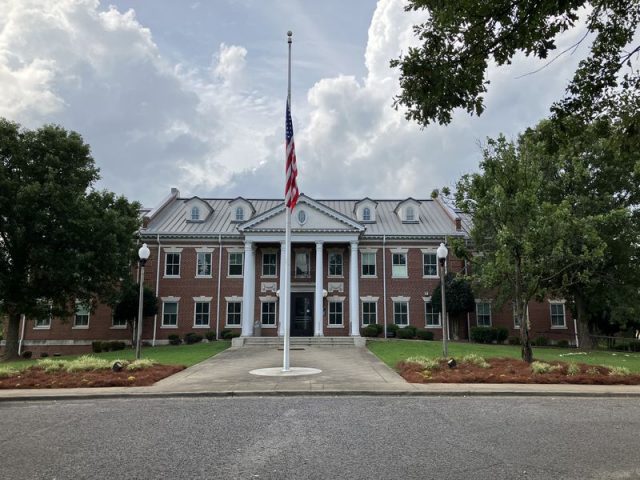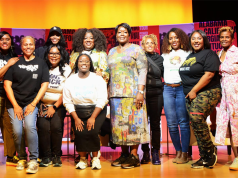
By Alaina Bookman | abookman@al.com
This is another installment in The Birmingham Times/AL.com/CBS42 joint series, “Beyond the Violence: What Can Be Done to Address Birmingham’s Rising Homicide Rate?” Click here to sign up for the newsletter.
Jamaine Stanton said he’s seen the impact of Birmingham’s new RESTORE program first-hand with the young people he works with.
After joining RESTORE, one young man started working on a license to become a truck driver, a goal he once thought was unachievable.
Stanton and other community organizers launched RESTORE in the spring of 2023 with the goal of helping families and young people impacted by the juvenile justice system. By offering tailored support, advocates say, they can intervene in cycles of crime and help more young people make positive life choices.
“One thing I can say RESTORE has shown me is that these families are used to being written off,” Executive Director Carrie Buntain said. “These are the youth that no one has ever sat down with them and asked, ‘have you ever thought about owning your own business, getting your CDL or going to college?’”
The program is part of a citywide effort to tackle violence in Birmingham and redirect people onto better paths. When youth are not given the resources needed to succeed after becoming juvenile justice involved, they are more likely to be perpetrators or victims of violent crimes, experts say.
In Birmingham in 2022, 49 of the people killed were aged 13 to 22 and 69% of those victims had prior Family Court involvement. Of 60 young adults charged with murder, 83% also had prior Family Court involvement, according to information shared by city officials.
A selection committee composed of RESTORE program coordinators Jamaine Stanton and Antski Williams, juvenile detention officer supervisors and a representative from the Adolescent Substance Abuse Program and mental health unit identify program participants. The selection committee acts as a liaison between RESTORE and the Youth Detention Center, who personally speak with the youth about their backgrounds.
“We basically do a one-on-one assessment to assess their needs. What we try to do when we talk to our participants is ask them what their goals are, what their long-term goals are, what their plans are,” Stanton said.
“When they share that with us, then we can try to work to remove whatever barriers they have that are preventing them from accomplishing those goals. Everyone gets an individual service plan.”
Tailoring Services
Buntain said this process allows them to tailor their services to the needs of each individual within the program.
The program includes services such as family intake and assessment, case management, counseling, paying for essential documents such as state ID or work certifications, transportation, safe housing, advocacy and creation of an educational or career plan.
“We have different tactics depending on what side of town they live on, depending on what housing project they come from, or what history it shows us in their paperwork. It determines how we approach them to extract the most information to be able to help them better,” Williams said.
“What we discuss is the train of thinking, the history, the dysfunction, everything that created that environment or that state of mind that led you to do what you did that got you here,” Williams said.
Buntain said advocates must often identify learning barriers. She said many of the participants have not thrived in traditional learning environments and are no longer attending school. Buntain said COVID learning loss and low access to educational tools, transportation or special education resources often adds to educational strain for participants.
Program Coordinators created RESTORE workshops through a partnership with the Crescent Cultural Community Center. These workshops are hosted in Birmingham’s West End, one of the most violent areas in the city, away from the family court and detention center.
The workshops teach participants about the “principles of manhood,” real world situations and consequences and the importance of setting goals, with children as young as 10 years old attending. Participants have also begun to bring their friends and family members to the workshops.
Other community organizations have gotten involved with the RESTORE program such as Faith in Action, whose members have gotten eight eligible participants registered to vote.
University of Alabama at Birmingham TRIO members are helping participants get jobs while connecting them with educational programs. This program has gotten three RESTORE participants employed.
Buntain said these opportunities allow the participants to see life beyond their involvement with the justice system. Voting and educational opportunities are a way to empower them to take charge of their own futures.
“We just want to empower them. We want them to know that they’re being heard,” Stanton said. “At that time, it may seem like pie in the sky but I want them to know that they can do that. That’s achievable. They can dream big, and we will work with them to achieve these goals.”
Reshaping Core Values
The coordinators said they have also involved credible messengers in the program, people with firsthand experience of being involved in crime or violence who now use their experiences to mentor youth and transform destructive thinking, attitudes and actions.
“The workshops penetrate the dysfunction, it unravels the dysfunction,” Williams said. “We reshape their core values.”
Williams said the workshops are a safe, nonviolent space. People affiliated with rival gangs attend the workshops together, with no conflict. “We show you the commonality between each other and then we begin to fix those core issues.”
Though the program has only been around for four months, Buntain has high hopes for the future of RESTORE.
Buntain said she hopes to reduce the minimum age requirement to 11 years old and expand the program’s reach beyond Jefferson County. She is working with city organizers on getting a grant to further expand the program’s reach to impact the lives of youth regardless of their zip code.
Program coordinators are tracking risk assessments, educational baselines and outcomes, job placement success and recidivism rates of all RESTORE participants to measure the program’s impact.
Their goal is to reduce the negative contact people may have with the family court and prepare those who enter the juvenile justice system for a successful life, to leave the program with an educational path, a job and other long term goals.
“It’s hard to quantify when you prevent something, but when you look at your role in the services we provide, all of that is prevention,” Williams said.
“Because they’re so used to violence, they have no idea of the other world that’s out there. To see their eyes light up, you want to make sure you do everything to continue to create that environment.”
Young people who are eligible to participate in the RESTORE program must meet partial criteria:
- 16-19 years old
- Jefferson County resident
- Must be involved in juvenile justice
- Minimum 30 days out of home placement behind a criminal charge
- At risk of homelessness
- Identifies as gang affiliated
- At risk of not finishing high school
- Mental health diagnoses
- Recent Department of Human Resources involvement
Referrals must be made through the participant’s probation officer. Program coordinators are then able to access their records through the family court to learn more about their history and the crimes they have been charged with.
Alaina Bookman’s position at AL.com is partially grant- and donor-supported. Readers can support her work by contributing financially. Contributions are partially matched by Report for America.
Support her work and the future of sustainable, local journalism here.




